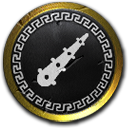A Quick Summary of New Civilizations: Thebans

The great power of Central Greece and leader of the Boeotian confederacy, Thebes is a force to be reckoned with. It is a major rival of ancient Athens, and sided with the Persians during the 480 BC invasion under Xerxes. Theban forces ended the power of Sparta at the Battle of Leuctra in 371 BC under the command of Epaminondas. The Sacred Band of Thebes (an elite military unit) famously fell at the battle of Chaeronea in 338 BC against Philip II and Alexander the Great. Prior to its destruction by Alexander in 335 BC, Thebes was a major force in Greek history, and was the most dominant city-state at the time of the Macedonian conquest of Greece.
Bonuses/Penalties
Like all Greek city-state civs, the Thebans have a -10% population cap penalty. This only comes into play in long matches, where the powerful roster of Greek blacksmith and barracks techs can help make up the difference: quality over quantity.
The Hellenization bonus is triggered by building a Greek Theater. This expands the territory effect of buildings by +20%.
The Oblique Order formation is an extra deep phalanx formation with a trample effect.
And the Siege of Delion bonus gives Thebes access to the powerful Fire Raiser siege unit.
Heroes, Champions, and other special units
(Hero) Epimanondas: Leader, statesman, and general of the Boeotian city-state Thebes during its moment of ascendency during the middle decades of the 4th century BC.
(Hero) Pelopidas: Pelopidas (died 364 BC) was an important Theban statesman and general in Greece. He led the Theban Sacred Band to defeat a much larger Spartan force early in his career. Later he accompanied his friend and co-Boeotarch, Epaminondas, in defeating the Spartans at the Battle of Leuktra using the novel Oblique Order phalanx formation, focusing their forces on one part of the Spartan line in order to break it and route the rest of the enemy army. At the end of his life, Pelopidas was called upon by the towns of Thessaly to protect them against the rising ambitions of Alexander of Pharae. He managed to defeat Alexander, but in his haste to strike the final blow on Alexander, Pelopidas was himself slain.
(Hero) Gorgidas: Gorgidas was the first known Theban military leader of the Sacred Band of Thebes around 378 BC. Plutarch in his Life of Pelopidas credits Gorgidas with the creation of the Sacred Band, which he dispersed at first throughout the front ranks of the regular infantry, with the idea that they would inspire valour; however they were later arrayed by Pelopidas as a unit in order to make their gallantry more conspicuous.
(Champion) Sacred Band Hoplite: The Sacred Band of Thebes was a troop of picked soldiers, consisting of 150 pederastic male couples which formed the elite force of the Theban army in the 4th century BC. It is said to have been organised by the Theban commander Gorgidas in 378 BC and to have played a crucial role in the Battle of Leuctra.
(Champion) Thespian Black Cloak: The Thespians were among the 700 or so soldiers to stay behind and hold the pass at Thermopylae to delay the Persians long enough for the rest of the Greek army to withdraw. This heroic deed made the Thespians "friends forever" to the Spartans. Later, Thespiae was an influential member of the Boeotian Confederacy.
(Special) Fire Raiser: At the siege of the Athenian fortress at Delion, the Thebans employed what may be deemed the first recorded use of a flame thrower in warfare, the Fire Raiser.

